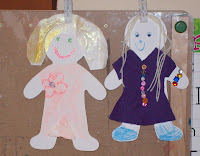
I am currently attending the NAEYC Professional Development Conference being held in Phoenix. I attended a wonderful workshop today about welcoming all children to the table in the classroom.
Sometimes 'null' curriculum (curriculum that we don't intentionally teach, but the children still learn) is reinforced as much as the 'explicit' curriculum (core standards). What do children understand about life in the classroom by the way we respond to daily occurrences?
We watched a video of an interview with an elementary child, Mary. Mary stated that when another child asked the teacher why Mary had two dads instead of a mom, the teacher responded, "We are not going to talk about that in this class." Mary felt unsupported and the result was that some children began to taunt Mary at recess. She began to dislike coming to school because she thought she must be a bad person.
While there are many more issues that can occur in the classroom, this episode is an example of when teachers choose not to address something they personally find uncomfortable. That refusal can speak volumes to the children.
Since our job is to support ALL children, we need to be prepared to address null curriculum issues when they happen during the school day. Much like taking a test, if we are prepared, we can address the issue and support the child. I try to ask my pre-service teachers, "What will you do or say if this happens? Or this?" I believe prior thought and understanding can prepare these future teachers to respond appropriately.
As educators, we need to always remember that a child seldom is in the position to choose his religion, culture, lifestyle or family makeup. Even though our values may be different, it is critical to support that child in his educational journey. Not doing anything or refusing to have the discussion is not an option. If the teacher in the video was uncomfortable addressing the issue, she only needed to say, "That is the makeup of Mary's family. Isn't it wonderful that all of our families are different and we can be happy." I like the part of NAEYC's Code of Ethical Conduct which says, "...do no harm."
No comments:
Post a Comment